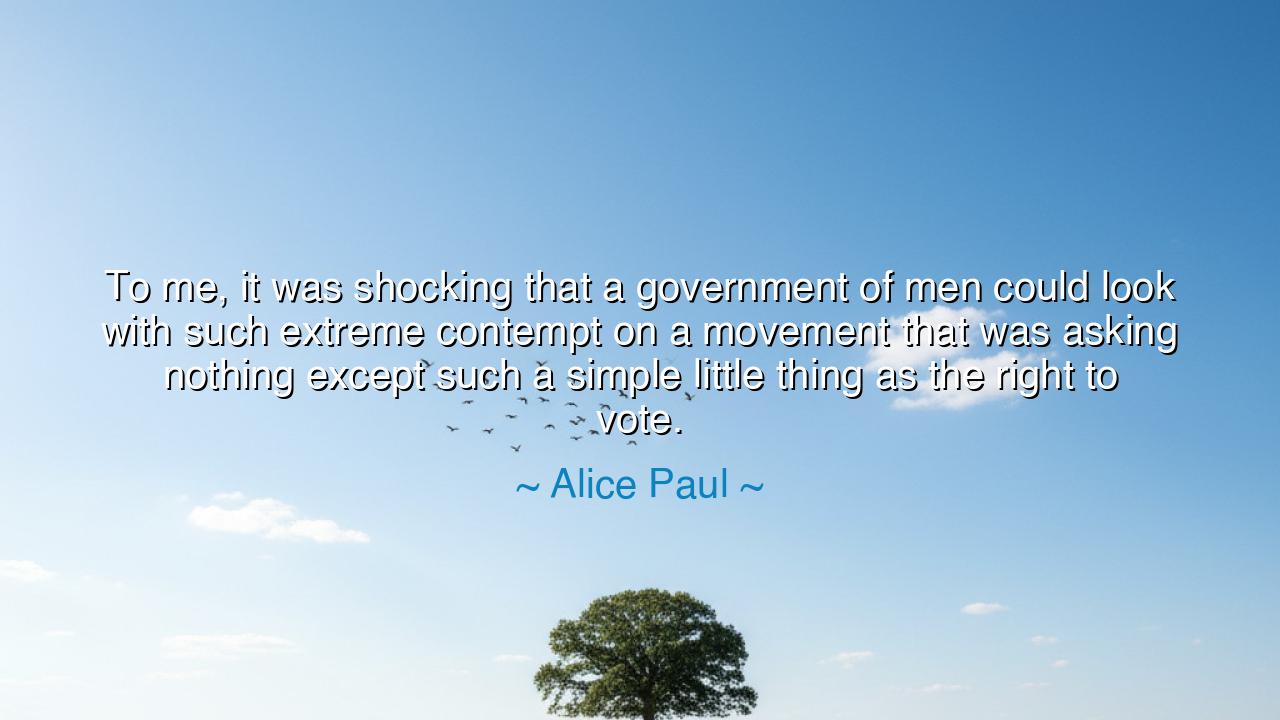
To me, it was shocking that a government of men could look with
To me, it was shocking that a government of men could look with such extreme contempt on a movement that was asking nothing except such a simple little thing as the right to vote.






When Alice Paul spoke these burning words — “To me, it was shocking that a government of men could look with such extreme contempt on a movement that was asking nothing except such a simple little thing as the right to vote” — she was not uttering mere rhetoric. She was bearing witness to the hypocrisy of power. In those years of struggle, when women marched through the streets of Washington and endured imprisonment for their demand of equality, she saw clearly the vast gulf between the promise of democracy and the practice of it. The right to vote, that sacred cornerstone of liberty, had been denied to half the human race. And those who held authority — the men who claimed to guard the Republic — treated the women’s plea not with reason, but with contempt, as though justice were a privilege to be granted, not a birthright to be recognized.
To understand the depth of this quote, one must return to the early 20th century, when the suffrage movement in America had reached its fevered height. Alice Paul, educated, disciplined, and unyielding, brought the spirit of moral warfare into politics. She led the National Woman’s Party, organized parades and pickets before the White House, and endured brutal force-feedings in prison after hunger strikes. The government she spoke of was not an abstract entity — it was a living wall of indifference and arrogance, built by those who feared the rising voice of women. Her words expose the bitter irony of a government founded on freedom, yet blind to its own chains.
Imagine the scene in 1917: women standing before the White House gates, holding banners that read, “Mr. President, how long must women wait for liberty?” These were not rebels seeking revolution, but citizens pleading for inclusion in the nation’s most sacred ritual — the act of voting. Yet they were mocked, arrested, and beaten. Paul herself was taken to the Occoquan Workhouse, where she was chained and abused for her defiance. It was there, in that dark place, that she grasped the full measure of the government’s contempt. Her realization was not of despair, but of awakening — that justice does not come from those in power, but from those who dare to challenge it.
History would later vindicate her. In 1920, with the ratification of the 19th Amendment, the right to vote was at last extended to women — a victory bought with endurance, sacrifice, and pain. But the lesson she left behind was larger than suffrage alone. It was a revelation about the moral blindness of institutions, how easily power turns noble ideals into empty words when untested by conscience. Her astonishment — that a “government of men” could act with such disdain — is the cry of every generation that discovers hypocrisy at the heart of authority.
And yet, there is a fierce beauty in that cry. For from the shock of injustice, the fires of reform are born. Alice Paul’s indignation became the spark that reignited a nation’s moral awareness. Her struggle reminds us that the right to vote, the right to be heard, the right to participate in the destiny of one’s country — these are not favors granted by benevolent rulers, but inheritances of humanity. To deny them is to betray the very essence of freedom.
Consider this: each time a citizen casts a ballot today, they tread upon ground once soaked in the tears and courage of those who fought for that right. The act may seem small, yet it is the pulse of democracy itself. To neglect it is to dishonor those like Alice Paul who suffered so that we might speak. Her words should awaken in us both gratitude and vigilance — gratitude for the rights we enjoy, and vigilance against those who would erode them.
The lesson is eternal: power without empathy becomes tyranny, and liberty without participation decays into illusion. Every age must rediscover the meaning of equality, for complacency is the grave of justice. Let us remember, then, the spirit of Alice Paul — her unbending will, her fearless confrontation with contempt, her faith in a better tomorrow.
And so, the teaching stands: when you see injustice cloaked in respectability, do not bow. When those in power scorn the cry for fairness, speak louder. The right to vote, to choose, to shape your destiny — these are not “simple little things,” but the pillars upon which freedom rests. Guard them as she did: with courage, endurance, and the unyielding belief that even the smallest voice can shake the mightiest throne.






AAdministratorAdministrator
Welcome, honored guests. Please leave a comment, we will respond soon